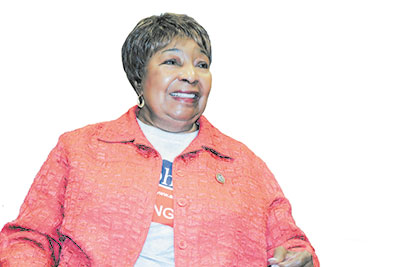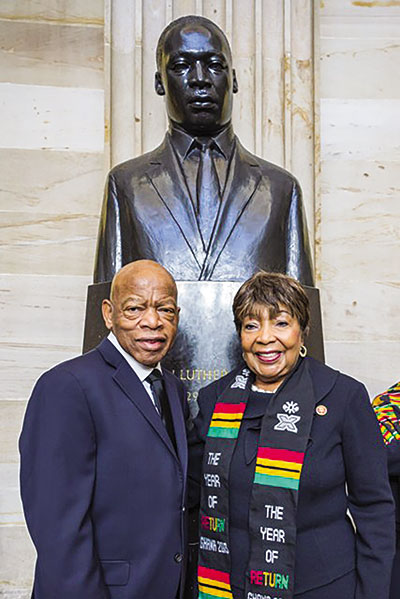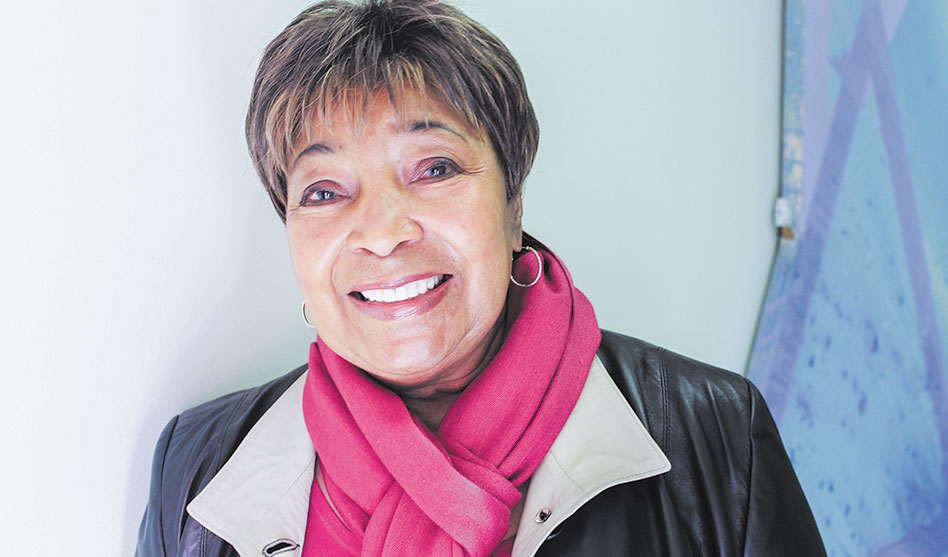Congresswoman Eddie Bernice Johnson will be remembered as a trailblazer with a mountain of firsts
DAVID TAFFET | Senior Staff Writer
taffet@dallasvoice.com
Eddie Bernice Johnson survived a lot of things in her life. Turns out, the one thing she wasn’t very good at was retirement. EBJ, as she was popularly known, died on Sunday morning, Dec. 31, at the age of 88, less than a year after she retired from Congress.
 Johnson began her political career as a voting rights activist. She said she and Dallas activist and City Council member Juanita Craft would pay the poll tax for people who couldn’t afford it at predominantly Black voting locations on Election Day.
Johnson began her political career as a voting rights activist. She said she and Dallas activist and City Council member Juanita Craft would pay the poll tax for people who couldn’t afford it at predominantly Black voting locations on Election Day.
Although she will be most remembered as a legislator, by training, she was a nurse. And probably got her first job at the Dallas VA Hospital by accident. She was born in Waco and had gone to Saint Mary’s College of Notre Dame in Indiana to get her nursing certificate (she couldn’t find a school in Texas that would admit her because of her race) she wasn’t asked to come in for an in-person interview. Officials at the Dallas VA hired her sight unseen, and they had no idea they were hiring someone who was Black. And her name — Eddie Johnson — led them to believe they were hiring a man.
In telling the story of what it was like being the first Black female nurse at the VA, Johnson said her shift ended at midnight, and the last Dallas Transit Service bus stopped at the hospital a few minutes later. But often, her supervisor would assign her a task a few minutes before her shift ended, assuring she’d miss that last bus.
So, after a long shift on her feet, Johnson often had no option other than to walk home — after midnight, and she lived near downtown.
Despite the roadblocks put in her way, Johnson eventually became the head psychiatric nurse at the Dallas VA. It was just the first of her many firsts.
Johnson’s career in elective politics began when she met Stanley Marcus, the Dallas retail giant who saw her potential. He hired her to work for him on the condition she’d run for office. And in 1972, she was elected to the Texas Legislature to represent parts of Oak Cliff.
She became active in the Democratic Party, and, during the 1972 election, she worked with a young party organizer who had been sent to Texas. His name was Bill Clinton.
When Jimmy Carter was elected in 1976, Johnson accepted a position with what was then known as the Department of Health, Education and Welfare. But in 1986, she went back into elective politics, running for and being elected to a seat in the Texas state Senate. That was just as AIDS was beginning to hit Dallas hard.
 William Waybourn, who was president of Dallas Gay Alliance at the time, described what it was like working with her: “She was very good on our issues,” he said, adding that because she was a registered nurse, “she didn’t need educating.”
William Waybourn, who was president of Dallas Gay Alliance at the time, described what it was like working with her: “She was very good on our issues,” he said, adding that because she was a registered nurse, “she didn’t need educating.”
Waybourn described Johnson as always cordial and engaged, saying she not only understood the need for access to healthcare but also the need to have healthcare without discrimination. It was a time when conservative lawmakers were considering legislation to quarantine gay men as their solution to stopping the spread of AIDS, so Johnson probably had to spend more time stopping such bad legislation as she did advancing good legislation.
When Dallas Gay Alliance was creating the new AIDS Resource Center, Waybourn said, they asked Johnson, “Do you mind if we put your name on our board of advisors?” He said she wasn’t in any way reluctant about it. “She showed up for us. She always made the right choice,” he said.
After her election to Congress in 1992, Johnson maintained a good rapport with Dallas County at a time when only one Democrat sat on the Dallas County Commissioner’s Court. That was important, because Ryan White AIDS funding came from the federal government, but it was distributed by the county, and in Dallas County, officials were often loathe to work with LGBTQ-run AIDS Service Organizations.
“There was great reluctance [among county officials] to have us get a cent,” Waybourn recalled.
But Johnson made sure Resource Center, AIDS Services Dallas and others were included in the distribution and that the money wasn’t just going to Parkland Hospital that had, at the time, just been sued in an effort to get the hospital to simply provide care to persons with AIDS.
Throughout her career, Johnson developed friendships within the LGBTQ community. First and foremost among her gay friends was Bill Nelson.
“I met her when she came to visit Bill Nelson while I was caring for him,” said home healthcare nurse Penny Krispin. “She loved Bill and Terry [Tebedo, his partner], and I thought she had an awesome presence. Loved her from that moment.”
After Nelson’s death, Johnson tried to have the Oak Lawn post office named for him, filing a bill to do so in each session. But there was one catch: Every member of the state’s congressional delegation has to sign on to a bill renaming a federal facility, and every session at least one member of the Texas delegation refused.

2019 Lewis & Johnson
On a personal note
Until her retirement last year, Johnson had represented me since she was first elected as my state senator in 1985. While I’d met her a number of times, our friendship began much later when the Dallas Morning News endorsed Stephen Broden, her 2010 opponent, and then had to rescind its endorsement when he said the violent overthrow of the government wasn’t out of the question if there wasn’t a change in leadership. This was shocking to hear in that pre-Trump era.
On Election Night that year, I was outside her campaign office, standing among a group of reporters trying to get into her watch party. Suddenly, I felt someone grab me, telling the other waiting newscasters, “We like him.” And I was in.
A few years later, Johnson moved her district office to the same Design District building where our Dallas Voice offices is located. On Fridays, when Johnson was in town, I’d get a call: “Come upstairs, honey,” she’d say.
We’d sit and talk for an hour or two. Sometimes she had a story to pitch me. Other times we’d just talk.
As chairperson of the Science, Space and Technology Committee, she was a wealth of information; one morning she explained the science behind driverless vehicles to me. Other times we’d discuss the progress of non-discrimination legislation that she was passionate about.
And sometimes I’d have a suggestion for her. One day, she was just frustrated by the attempts of her Republican colleagues to repeal Obamacare. So, I suggested she introduce legislation to repeal Obamacare and replace it with the Affordable Care Act.
“But they’re the same thing,” she said. Exactly, I told her. Every poll shows people hate Obamacare but love the Affordable Care Act. Your bill will preserve what people love and get rid of everything they hate about the law.
While my suggestion amused her, she was too serious a legislator to propose something so frivolous.
Almost two years, I got a couple of calls from people in Johnson’s office to make sure I’d be at her speech that weekend — the one that turned out to be her retirement announcement.
I sat on the floor of the auditorium in the front, and after she spoke, I walked up to the stage to wish her luck.
EBJ bent down and gave me a kiss. And the Morning News snapped a pic ture that they’ve used in at least 10 articles. What I love most about that picture are the people surrounding her, looking at me with quizzical faces as if asking, “Who the hell are you?”
Eddie Bernice Johnson will be remembered as a trailblazing legislator and civil rights advocate with a mountain of firsts to her credit: First Black woman nurse at Dallas VA; first chief psychiatric nurse at the hospital; first Black person elected to the Texas Legislature from Dallas; first nurse elected to Congress; third woman elected to Congress from Texas (In 1992, she was the only Texas woman in Congress; today there are eight); first Black woman to chair a standing congressional committee.
Around Thanksgiving, I got a message on Facebook from EBJ. “Miss you,” she wrote. We planned to get together after the New Year. We did not get the chance.
Miss you too, my friend.
………………..
Funeral arrangements
On Monday, Jan. 8, Rep. Eddie Bernice Johnson’s casket will lie in repose from 10 a.m.-3 p.m. at the Hall of State in Fair Park.
Also on Monday, a prayer service will be held from 6:30-8 p.m. at Concord Church, 6808 Pastor Bailey Drive in Dallas.
On Tuesday, Jan. 9, a funeral service will be held at 10 a.m. at Concord Church.
On Wednesday, Jan. 10, a graveside service and burial will be held, at 2 p.m. at Texas State Cemetery, 909 Navasota St., Austin.


Rest in peace, Ms. Johnson. Thank you for all you have done for our community and country. Your legacy will continue in the hands of your protege’, Jasmine Crockett. Thank you again. You are missed.
I didn’t know her well, but I will never forget the pride with which her mother introduced her to me.
“ She was born in Waco and had gone to Notre Dame in Indiana to get her nursing certificate (she couldn’t find a school in Texas that would admit her because of her race)”
Y’all can thank those conservative Catholics for giving Congresswoman Johnson the opportunity!
Please verify her attendance at Notre Dame, I believe she attended St Mary’s College instead of Notre Dame.
Notre Dame did not admit women until 1973.
you are correct. Saint Mary’s College of Notre Dame